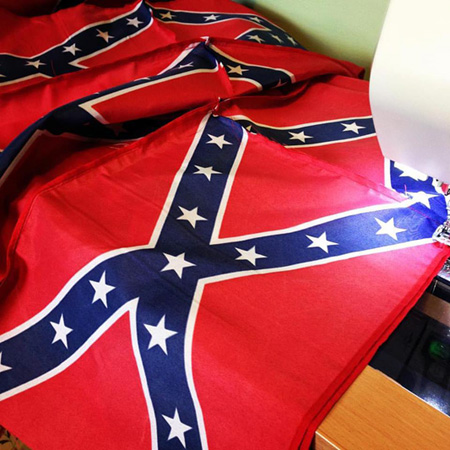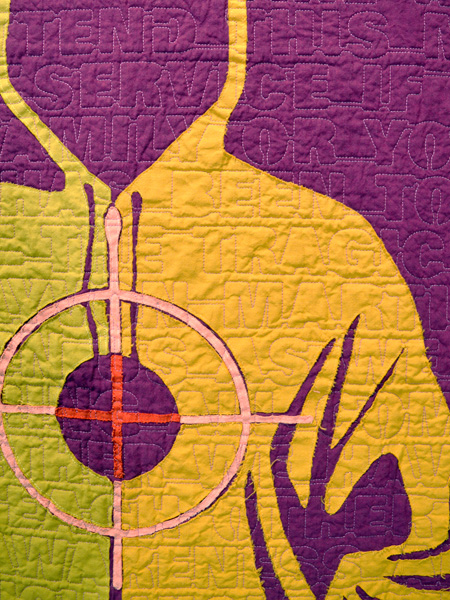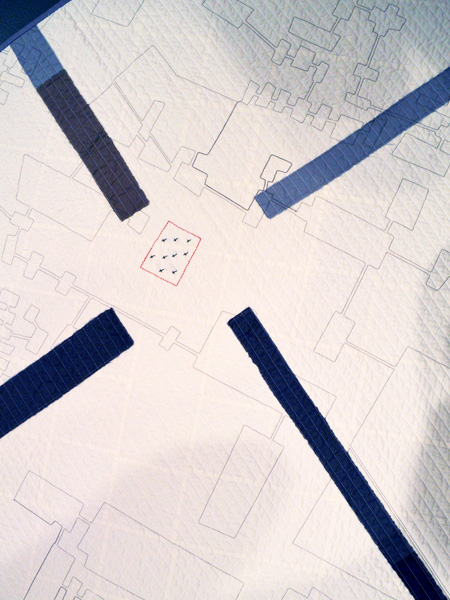I wish I could say this is not the America that I know, but that would be untrue, a whitewashing of the fact that the history of this country is written in the blood of people of color. The arrival of Europeans on this continent brought violence in its wake, forcing Native Americans off of the lands they had inhabited for centuries, killing those who resisted (and untold numbers who did not). And when the land had cleared they imprisoned millions of Africans, reducing them to chattel, inflicting endless violence on their bodies, stripping them of their dignity.

Your Heritage Is Written in Other People’s Blood (in-progress, 2016)
The very inception of this nation was made possible by the blood of those who did not look like my ancestors. And our original sin was written into Article 1 of our constitution when the 3/5 Compromise was struck. Ours is a history of violence and bigotry, whether it be slavery, the evils of Manifest Destiny, Jim Crow laws, ghettoization, racial profiling, or the thousand other excuses we have used to justify the ongoing subjugation of the other. My ancestors succeeded through force and justified it through a litany of morally bankrupt philosophies. And here is the hard truth: that history is not only our past; it continues to be written today.
And I am angry. And I am sad. And I am ashamed of myself.
Nearly four years ago my social positions got me in trouble in the quilting industry; my writing in the days following the shootings at Sandy Hook Elementary offended some major players and I was asked by one the companies I worked with to issue an apology. As you can imagine my response was not friendly; it was a compromise I could not make. But then I gave in; I began to play nice and carefully watched my words and skirted potentially sensitive topics. I comforted myself with the idea that I was still putting those concerns into the quilts, but art is easy, safe. It brings with it a certain protective cushion. And in my silence I became complicit, and my friends of color deserve my apology. I am sorry.
I am also done being silent. It is my responsibility to speak, not as a quilter, or as a public figure (of sorts), but as a human being. It is doubly my responsibility because I am a white man. It is my responsibility because as long as those who hold places of privilege remain silent this dreadful history will continue to be written. And I am very much privileged here in America simply by the chance truth of my birth-sex and the color of my skin. As a teenage punk in the suburbs of Detroit I was pulled over or questioned by police countless times because of the way I dressed, and I was nervous every time. I had reason to be nervous: I never could be sure if one of my friends might be carrying a joint or a couple of hits of acid. I was nervous because I did not want my slap on the wrist, but that was it. I was nervous, but never afraid. That is an important distinction. My friends of color, and millions of others I do not know personally, are afraid. And I am ashamed.

Tea and Skittles 40″ x 48″ (2016)
It has been more than four years since Trayvon Martin was murdered by George Zimmerman. Stand Your Ground was invoked to justify the killing because of course a young black man is a threat, even when all he is carrying is a can of tea and a small bag of Skittles. Racist America found its cause, its opportunity to renew the justifications of its bigotry and violence. It was easy for tens of millions to accept a young black man as implicitly dangerous, to avoid confronting their essential bigotry. Why didn’t Stand Your Ground protect Trayvon Martin? Why did those millions not see a young man defending himself against an armed stranger who had been following him, stalking him (while ignoring the requests of the police on the phone)? This is not a rhetorical question; it is the essential question that we all must ask ourselves.
This is not a new story; it is only more present now because there is video evidence. Eric Garner, Jonathan Ferrell, Terrence Crutcher. These and so many other names ought to be seared into our consciousness. In another country we would be calling these extra-judicial killings, but we refuse to see that in ourselves. But America is special; our mythos tells us that such things cannot happen here. Thus we ignore the evidence, cannot even approach it because the justness of our country is taken as an a priori truth
Because we, white America, cannot bear the possibility that we are flawed, that we are the root of so many ills, we will continue to cling to any justification, any excuse. If we dare to accept the possibility of bigotry, whether explicit or implicit, we would be forced to confront ourselves, our own complicity. Perhaps Terrence Crutcher was walking back to his car (with his hands raised) to get a weapon. Just maybe Jonathan Ferrell was running with ill intent. It’s possible Eric Garner could be dangerous, because he was big. Hypothetically anything is possible, but we will never know. Assumption trumped evidence, and all three men were killed. But that lack of certain knowledge allows us to make excuses: we declare the use of deadly force to be a “judgment call,” no matter how many times a shooter’s judgment is shown to be wrong. The benefit of the doubt always falls in one direction.”
Clearly being a police officer is a difficult job. I would not want to do it, at least not in this country. But the badge carries responsibilities along with authority. In 1985 the Supreme Court ruled on the use of deadly force in Tennessee v. Garner, affirming the notion that deadly force was to be a last resort, requiring “probable cause to believe that the suspect poses a significant threat of death or serious harm.” It is important to note that “probable cause” is a specific legal term that has widespread implications across the gamut of law enforcement; it is the cornerstone protection against random searches and invasions of privacy; it is the reason hunches are clearly differentiated from evidence. It is a high standard put in place precisely to counter the effects of bias, presumption, and bigotry. And it is what has been systematically denied to the African-American community. Potential is not actuality unless we accept the idea that black men are implicitly dangerous, and to accept that is fundamentally racist.

Emanuel: At the Intersection of Hate and Guns 86″x86″ (2016)
The man who murdered nine people in a church in Charleston, South Carolina was arrested and given a meal from Burger King. The man who planted bombs in New York and New Jersey just days ago was taken into custody even after he shot a police officer. But somehow a black man with car troubles requires deadly force. Somehow the shooting of Trayvon Martin was justified.
Moments are complicated. Fear is real. But actions must be grounded in reality, not assumption. This is a truth that pertains to all of us. I am reticent to lay the blame on individual police officers or police departments; they are simply a reflection of society. We, white America, have created a world in which racist assumptions are accepted, permitted, and supported. By our choices, from the people we elect to the words we do not speak, we are to blame. As we cling to our privilege in the face of a world that sees our bigotry for what it is, each and every one of us makes this possible. This is not about individual blame, though there is plenty of that to go around; it is about collective responsibility, an admission of history and the long tail of its effects. It is about seeing the truths that surround us. This is white America’s problem that plays itself out on the lives and bodies of our neighbors and friends, in communities across the nation.
We, white Americans, are not the center of the universe, and our violence can no longer be hidden, swept under the carpet, and justified by our anxieties. Our actions and inactions have profound ramifications, and we will be judged by them. Silence is complicity; in permitting the justifications we confess our own bigotry. As we accept this litany of death we only reaffirm this country’s original sin: we reassert the constitutional dehumanization of the 3/5th Compromise. Art is not good enough. Quiet agreement is not enough. National conversations are not enough. Turning the page is not enough; we have tried that too many times, in 1863, in 1865, in 1964, and in 1965. We have tried to assuage our guilt a page at a time, but nothing short of a new book will do, and that is not our book to write; we are unfit to be our own judges, as we have all too clearly shown. I confess I have no idea how that books gets written; I only know it must.
Somehow.
Until then I shall remain angry. I shall remain sad. And more than anything I shall remain ashamed…









4 Responses to Original Sin…